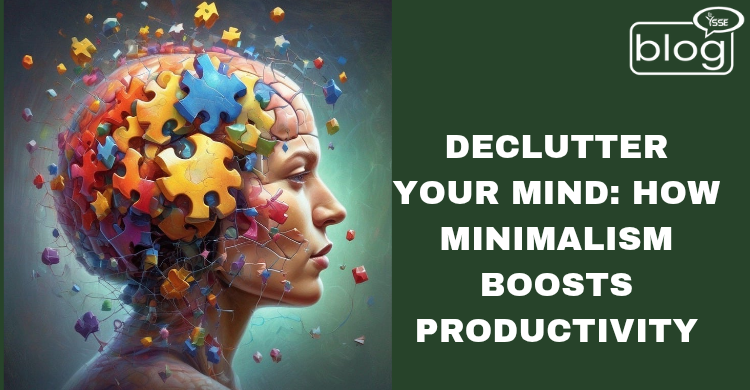🧠 Imagine waking up in the morning…with a phone filled with unread messages and emails, a desk filled with undone papers, and a to-do list that seems nearly impossible. At the beginning of the day, your mind feels overwhelmed. In today’s world, mental clutter is as important as physical clutter. Minimalism is not only owning things but also a mindset and feelings that keep us from unnecessary distractions. Besides, minimalism includes creating space for your own time, focus, and productivity. How does decluttering your mind affect your life for more efficiency? Let’s explore!
🔬 The Science Behind Minimalism and Productivity
Research gives us information that an overloaded mind gives people stress, less focus, and a lack of decision-making skills. Also, struggling with time management, stress management, and self-development. Psychology suggests that both physical and mental health help us concentrate on focused subjects, enrich attention, and complete tasks within time. A famous neurologist, Daniel Levin, explains about mental information that our brain has a limited capacity to process information. When we try to maintain or juggle too much information and too many thoughts, our cognitive abilities decline, and we burn out. Minimalism helps us to make decisions, enhance focus, and promote mental clarity.
🚀 How Decluttering Your Mind Boosts Productivity
• Prioritization: Minimalism suggests you do the essential task first. Focus on what truly matters. By prioritizing your priorities and essential tasks and cutting out unnecessary tasks, you can be more focused, dedicated, and productive on meaningful work. We can use the Pareto principle, which identifies 20% of your tasks and 80% of the results. Also, apply the Eisenhower matrix that separates the urgent work from the important tasks to avoid wasting time.
• Digital decluttering: Nowadays, we are all dependent on the internet and digital activities. Digital noise—emails, notifications, and endless scrolling are very common. Digital minimalism encourages us to use digital platforms in control. Some simple steps are 1. Unsubscribe from unnecessary emails, YouTube channels, etc. 2. Set screen-free hours. 3. Limit your social media browsing.
• Minimalist workspace: A cluttered desk is important to clutter the mind. Many psychologists say that an organized workplace could reduce your stress levels and improve your concentration. Keep only the essentials on the desk that keep your work smooth and time-saving.
• Medical Charity: Some medical exercises, like medications, journaling, and deep breathing exercises, can help you clear mental clutter and make it easier to keep healthy. Even 5 minutes of exercise can impact cognitive function and productivity.
• Saying ‘No’: Many of us are struggling with productivity because of a lack of time and over-commitment. Minimalism encourages us to say no to unnecessary obligations. Prioritize the task that aligns with your goals. Reduce multitasking and set boundaries to protect your mental space.
Minimalism is not about doing less work; it is about doing the actual work that matters most. By adopting minimalism, you will experience less stress, more productivity, and better health. Starting small can change your lifestyle.
Tidy your work routine, focus on your destination, and truly matter to your life.
To read more blogs like this, click here
Writer
Mst. Tahrima Akter
Intern
Content Writing Department
YSSE

